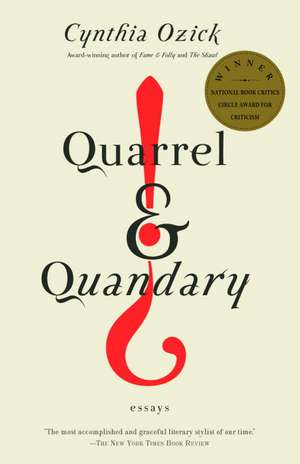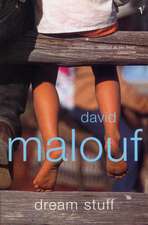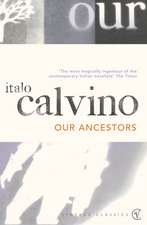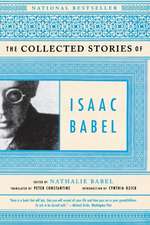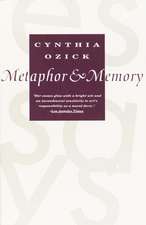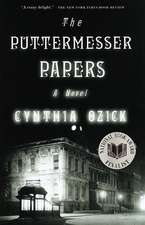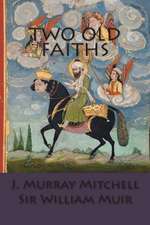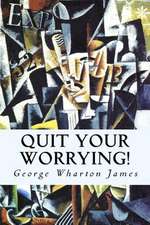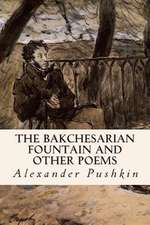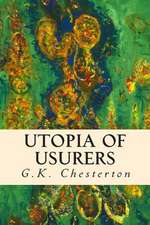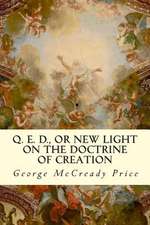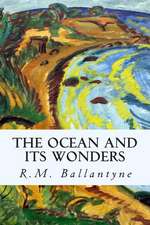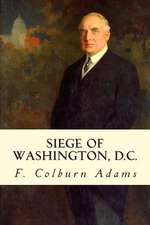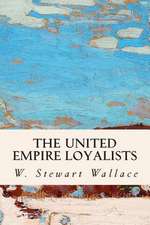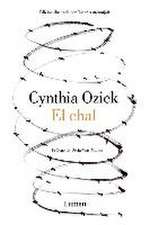Quarrel & Quandary: Essays
Autor Cynthia Ozicken Limba Engleză Paperback – 31 oct 2001
Vezi toate premiile Carte premiată
In nineteen opulent essays, Cynthia Ozick probes Dostoevsky for insights into the Unabomber, questions the role of the public intellectual, and dares to wonder what poetry is. She roams effortlessly from Kafka to James, Styron to Stein, and, in the book's most famous essay, dissects the gaudy commercialism that has reduced Anne Frank to "usable goods." Courageous, audacious, and sublime, these essays have the courage of conviction, the probing of genius, and the durable audacity to matter.
Preț: 106.45 lei
Nou
Puncte Express: 160
Preț estimativ în valută:
20.37€ • 21.34$ • 16.84£
20.37€ • 21.34$ • 16.84£
Carte disponibilă
Livrare economică 21 martie-04 aprilie
Preluare comenzi: 021 569.72.76
Specificații
ISBN-13: 9780375724459
ISBN-10: 0375724451
Pagini: 272
Dimensiuni: 130 x 203 x 15 mm
Greutate: 0.23 kg
Ediția:Vintage Intl.
Editura: Vintage Publishing
ISBN-10: 0375724451
Pagini: 272
Dimensiuni: 130 x 203 x 15 mm
Greutate: 0.23 kg
Ediția:Vintage Intl.
Editura: Vintage Publishing
Notă biografică
Cynthia Ozick lives in Westchester County, New York.
Extras
Forethoughts
"But you are engagé," the famous and energetic man who four years ago directed my play remarked the other day. I say "my play," and not "a play of mine," which may suggest more than one, because it is the only work for the theater I have ever written; I feel certain I will never write another. I had not seen the director since the play closed, and his comment -- that once-faddish, Sartre-sounding word -- startled me. My one play had, in fact, been political, even polemical; it was about Holocaust denial. And though I had always longed to try my hand at drama, I had supposed it would find its shape, if the time ever came, in something literary or satiric, or both; my secret mnemonic model was Simon Gray's frivolously melancholic The Common Pursuit, which had, decades ago, enthralled me. So I was surprised when a congeries of circumstances, not all of my own manufacture, resulted in a play that was indisputably "engagé." I had been driven to it like a wheel the spokes of which were being nailed into place, even while it ran, by mechanics in unfamiliar uniform.
I mean by all this that I resist the political, and am reluctant to take on its spots and stripes: the focus and deliberateness of political engagement, its judgments and its zeal, are so much the opposite of loafing and inviting one's soul. This collection, for instance, includes an essay on essays, wherein the form of the essay is defined, and defended, as follows: "If there is information in an essay, it is by-the-by, and if there is an opinion in it, you need not trust it for the long run. A genuine essay has no educational, polemical, or sociopolitical use." This was only the latest in a string of similar formulations -- or call them wardings-off; what was being warded off was any tincture of the topical or the tendentious. In 1983, in a foreword to my first non-fiction collection, I wrote, comparing essays to stories, "Sometimes even an essay can invent, burn, guess, try out, hurtle forward, succumb to that flood of sign and nuance that adds up to intuition, disclosure, discovery. The only non-fiction worth writing -- at least for me -- lacks the summarizing gift, is heir to nothing, and sets out with empty pockets from scratch." In a 1988 preface, this time dubbed a "forewarning," I continued along the same line, or tightrope: "Nearly every essay, like every story, is an experiment, not a credo. What I am repudiating," I persisted, "is the inference that a handful of essays is equal to a Weltanschauung; that an essay is generally anything more than simply another fiction -- a short story told in the form of an argument, or a history, or even (once in a very great while) an illumination. But never a tenet."
Can I make that stick here? Or, rather, can I claim that I have stuck to this credo-contra-credos? Or have I, despite these defensive and sometimes slippery declarations of resistance, fallen, after all, into the distinctly educational, polemical, and sociopolitical? How can I deny that I have willfully entered the lists of tenet and exigency in writing here on Anne Frank; or, contemplating the rights of history, on so-called Holocaust fiction; or on the responsibility of public intellectuals; or on Dostoyevsky's Unabomber; or on Central European politics and policies, ancient and modern, as a framework for Kafka's familial and personal history?
George Orwell, in "Why I Write," asserts that "the opinion that art should have nothing to do with politics is itself a political attitude." There are times when one is tempted to agree with him, and in my discussion of E. M. Forster's views on art in the terrible year of 1941, I do mainly agree -- or, in Forster's own formula ("Two Cheers for Democracy" is one of his celebrated phrases), I am willing to give the idea two cheers at least. Yet inserting politics into literature has, as we have seen, led to the extremist (or absurdist) notion that Jane Austen, for instance, is tainted with colonialism and slave-holding because Sir Thomas Bertram in Mansfield Park owns plantations in eighteenth-century Antigua. This kind of thinking fits nicely with James Thurber's tale of the bear who leaned so far backward that he fell on his face. It asks a novel of country-house manners to become a tract on British imperialism. Then must the soldiers and sailors in Jane Austen's fiction supply the occasion for a discourse on the Napoleonic Wars, or may they be left to their romantic employments in the minds of Austen's marriageable young ladies? (It is politics, of course, that accounts for the presence of those soldiers and sailors.) "No book is genuinely free from political bias," Orwell plausibly remarks -- which is different from saying that every book ought to be politically acceptable to contemporary sensibilities. If that were our objective, then scores of European classics, beginning with Chaucer's "The Prioress's Tale" -- the theme of which is responsible for centuries of calumny and bloodshed -- would have to be thrown out with the bath water. (Which is what some readers of "Who Owns Anne Frank?" concluded I was seriously recommending for the Diary in the closing paragraph of that essay; these same readers may possibly believe that Dean Swift meant it when he suggested, as a way of ameliorating famine in Ireland, that the Irish babies be eaten.) The writer's subject matter, Orwell goes on, "will be determined by the age he lives in -- at least that is true in tumultuous, revolutionary ages like our own." If Orwell is completely right, then both Jane Austen and E. M. Forster in 1941 (he was speaking at a writers' conference) are completely wrong. She declined to engage with colonialism, slavery, and the Napoleonic upheavals; he declined to engage with Hitler, anti-Semitism, and the German upheavals. Both were determined to be undetermined by the politics of the age they lived in. (And yet Forster, in 1924, had already published A Passage to India, arguing against Britain as a colonial power.) If I feel less critical of Austen than of Forster (and I do), it is not only because there is a difference between a novel and a speech, but also because undoubtedly I am, as Orwell insists, determined by my own tumultuous age. Never mind that we are launched now into the twenty-first century; as my essay on the contentions of history and imagination may signify, the twentieth is not yet done with us, nor we with it.
The central question, perhaps, is this: is politics a distraction from art, or is it how we pay attention to the life that gives rise to art? And might not the answer be: both, depending on the issues and the times? A reflection on a ladle in a kitchen drawer can outweigh what the President is up to when what the President is up to is too trivial to bear serious contemplation. The essential point has to do with the idea of the ephemeral. History is and is not ephemeral; situations and events evaporate, but their moral and intellectual residue does not. A century afterward, contemporary incarnations of Dreyfusards and anti-Dreyfusards are plainly recognizable. In a post-theological era, a romantic paganism (sometimes labeled "spirituality") freely roams. What Saul Bellow calls "the oceanic proliferating complexity of things" sweeps the mind away from concentration. Concentration on what? On the non-transient. And it is on that negative ground that I set my purpose.
In a recent issue of one of those Internet magazines (I read it in the paper version), a pair of reviewers in e-mail dialogue faulted an esteemed young critic of earned authority for writing about the old moderns -- Chekhov, Flaubert, Mann, Woolf -- as if to say that ripeness isn't all it's cracked up to be. (They were this-generation reviewers, and appeared to regard the critic as a traitor to his cohort.) What was clearly in play was the journalistic conviction -- a kind of noose -- that there is only so much space on a page (even on a cybernetic page), so it had better be filled up with Now: Now being the politics of the current literary marketplace. Generations, yours and mine, are broader and roomier and more flexible than that. Commenting on the beautiful heads of unschooled TV anchormen, Bellow notes, "These crowns of hair contribute charm and dignity but perhaps also oppress the brain with their weight." Journalism is a necessity, but it is not a permanence. When I hear someone (seventy-plus or twenty-something) utter "my generation," I know I am in the vicinity of a light mind. This is not what Orwell intended when he spoke of being determined by the turbulence of one's own time. When we allude to "our age," either we include our predecessors and their travail (and also their bold genius) or we show ourselves to be minor in brain and intuition.
Two cheers, then -- when there is no choice -- for being engagé; but three cheers and more for that other bravery, the literary essay, and for memory's mooning and maundering, and for losing one's way in the bliss of American prose, and finding one's way, too, when politics is slumbering, in the surprising atlas of all that is not benign, yet (somehow, sometimes) stirring.
June 1999
From the Hardcover edition.
"But you are engagé," the famous and energetic man who four years ago directed my play remarked the other day. I say "my play," and not "a play of mine," which may suggest more than one, because it is the only work for the theater I have ever written; I feel certain I will never write another. I had not seen the director since the play closed, and his comment -- that once-faddish, Sartre-sounding word -- startled me. My one play had, in fact, been political, even polemical; it was about Holocaust denial. And though I had always longed to try my hand at drama, I had supposed it would find its shape, if the time ever came, in something literary or satiric, or both; my secret mnemonic model was Simon Gray's frivolously melancholic The Common Pursuit, which had, decades ago, enthralled me. So I was surprised when a congeries of circumstances, not all of my own manufacture, resulted in a play that was indisputably "engagé." I had been driven to it like a wheel the spokes of which were being nailed into place, even while it ran, by mechanics in unfamiliar uniform.
I mean by all this that I resist the political, and am reluctant to take on its spots and stripes: the focus and deliberateness of political engagement, its judgments and its zeal, are so much the opposite of loafing and inviting one's soul. This collection, for instance, includes an essay on essays, wherein the form of the essay is defined, and defended, as follows: "If there is information in an essay, it is by-the-by, and if there is an opinion in it, you need not trust it for the long run. A genuine essay has no educational, polemical, or sociopolitical use." This was only the latest in a string of similar formulations -- or call them wardings-off; what was being warded off was any tincture of the topical or the tendentious. In 1983, in a foreword to my first non-fiction collection, I wrote, comparing essays to stories, "Sometimes even an essay can invent, burn, guess, try out, hurtle forward, succumb to that flood of sign and nuance that adds up to intuition, disclosure, discovery. The only non-fiction worth writing -- at least for me -- lacks the summarizing gift, is heir to nothing, and sets out with empty pockets from scratch." In a 1988 preface, this time dubbed a "forewarning," I continued along the same line, or tightrope: "Nearly every essay, like every story, is an experiment, not a credo. What I am repudiating," I persisted, "is the inference that a handful of essays is equal to a Weltanschauung; that an essay is generally anything more than simply another fiction -- a short story told in the form of an argument, or a history, or even (once in a very great while) an illumination. But never a tenet."
Can I make that stick here? Or, rather, can I claim that I have stuck to this credo-contra-credos? Or have I, despite these defensive and sometimes slippery declarations of resistance, fallen, after all, into the distinctly educational, polemical, and sociopolitical? How can I deny that I have willfully entered the lists of tenet and exigency in writing here on Anne Frank; or, contemplating the rights of history, on so-called Holocaust fiction; or on the responsibility of public intellectuals; or on Dostoyevsky's Unabomber; or on Central European politics and policies, ancient and modern, as a framework for Kafka's familial and personal history?
George Orwell, in "Why I Write," asserts that "the opinion that art should have nothing to do with politics is itself a political attitude." There are times when one is tempted to agree with him, and in my discussion of E. M. Forster's views on art in the terrible year of 1941, I do mainly agree -- or, in Forster's own formula ("Two Cheers for Democracy" is one of his celebrated phrases), I am willing to give the idea two cheers at least. Yet inserting politics into literature has, as we have seen, led to the extremist (or absurdist) notion that Jane Austen, for instance, is tainted with colonialism and slave-holding because Sir Thomas Bertram in Mansfield Park owns plantations in eighteenth-century Antigua. This kind of thinking fits nicely with James Thurber's tale of the bear who leaned so far backward that he fell on his face. It asks a novel of country-house manners to become a tract on British imperialism. Then must the soldiers and sailors in Jane Austen's fiction supply the occasion for a discourse on the Napoleonic Wars, or may they be left to their romantic employments in the minds of Austen's marriageable young ladies? (It is politics, of course, that accounts for the presence of those soldiers and sailors.) "No book is genuinely free from political bias," Orwell plausibly remarks -- which is different from saying that every book ought to be politically acceptable to contemporary sensibilities. If that were our objective, then scores of European classics, beginning with Chaucer's "The Prioress's Tale" -- the theme of which is responsible for centuries of calumny and bloodshed -- would have to be thrown out with the bath water. (Which is what some readers of "Who Owns Anne Frank?" concluded I was seriously recommending for the Diary in the closing paragraph of that essay; these same readers may possibly believe that Dean Swift meant it when he suggested, as a way of ameliorating famine in Ireland, that the Irish babies be eaten.) The writer's subject matter, Orwell goes on, "will be determined by the age he lives in -- at least that is true in tumultuous, revolutionary ages like our own." If Orwell is completely right, then both Jane Austen and E. M. Forster in 1941 (he was speaking at a writers' conference) are completely wrong. She declined to engage with colonialism, slavery, and the Napoleonic upheavals; he declined to engage with Hitler, anti-Semitism, and the German upheavals. Both were determined to be undetermined by the politics of the age they lived in. (And yet Forster, in 1924, had already published A Passage to India, arguing against Britain as a colonial power.) If I feel less critical of Austen than of Forster (and I do), it is not only because there is a difference between a novel and a speech, but also because undoubtedly I am, as Orwell insists, determined by my own tumultuous age. Never mind that we are launched now into the twenty-first century; as my essay on the contentions of history and imagination may signify, the twentieth is not yet done with us, nor we with it.
The central question, perhaps, is this: is politics a distraction from art, or is it how we pay attention to the life that gives rise to art? And might not the answer be: both, depending on the issues and the times? A reflection on a ladle in a kitchen drawer can outweigh what the President is up to when what the President is up to is too trivial to bear serious contemplation. The essential point has to do with the idea of the ephemeral. History is and is not ephemeral; situations and events evaporate, but their moral and intellectual residue does not. A century afterward, contemporary incarnations of Dreyfusards and anti-Dreyfusards are plainly recognizable. In a post-theological era, a romantic paganism (sometimes labeled "spirituality") freely roams. What Saul Bellow calls "the oceanic proliferating complexity of things" sweeps the mind away from concentration. Concentration on what? On the non-transient. And it is on that negative ground that I set my purpose.
In a recent issue of one of those Internet magazines (I read it in the paper version), a pair of reviewers in e-mail dialogue faulted an esteemed young critic of earned authority for writing about the old moderns -- Chekhov, Flaubert, Mann, Woolf -- as if to say that ripeness isn't all it's cracked up to be. (They were this-generation reviewers, and appeared to regard the critic as a traitor to his cohort.) What was clearly in play was the journalistic conviction -- a kind of noose -- that there is only so much space on a page (even on a cybernetic page), so it had better be filled up with Now: Now being the politics of the current literary marketplace. Generations, yours and mine, are broader and roomier and more flexible than that. Commenting on the beautiful heads of unschooled TV anchormen, Bellow notes, "These crowns of hair contribute charm and dignity but perhaps also oppress the brain with their weight." Journalism is a necessity, but it is not a permanence. When I hear someone (seventy-plus or twenty-something) utter "my generation," I know I am in the vicinity of a light mind. This is not what Orwell intended when he spoke of being determined by the turbulence of one's own time. When we allude to "our age," either we include our predecessors and their travail (and also their bold genius) or we show ourselves to be minor in brain and intuition.
Two cheers, then -- when there is no choice -- for being engagé; but three cheers and more for that other bravery, the literary essay, and for memory's mooning and maundering, and for losing one's way in the bliss of American prose, and finding one's way, too, when politics is slumbering, in the surprising atlas of all that is not benign, yet (somehow, sometimes) stirring.
June 1999
From the Hardcover edition.
Recenzii
"Her best collection to date."
--The Boston Globe
"I urge all lovers of American prose to read it... Cynthia Ozick is, for my money, the most accomplished and graceful literary stylist of our time... Her pieces have genuine durability. They are great essays."
--John Sutherland, The New York Times Book Review
"Full of arresting turns of phraseÉ. Even when you disagree with her, she electrifies your mind."
--The New York Times
"I urge all lovers of American prose to read it... Cynthia Ozick is, for my money, the most accomplished and graceful literary stylist of our time... Her pieces have genuine durability. They are great essays."
--John Sutherland, The New York Times Book Review
"Full of arresting turns of phrase... Even when you disagree with her, she electrifies your mind."
--The New York Times
--The Boston Globe
"I urge all lovers of American prose to read it... Cynthia Ozick is, for my money, the most accomplished and graceful literary stylist of our time... Her pieces have genuine durability. They are great essays."
--John Sutherland, The New York Times Book Review
"Full of arresting turns of phraseÉ. Even when you disagree with her, she electrifies your mind."
--The New York Times
"I urge all lovers of American prose to read it... Cynthia Ozick is, for my money, the most accomplished and graceful literary stylist of our time... Her pieces have genuine durability. They are great essays."
--John Sutherland, The New York Times Book Review
"Full of arresting turns of phrase... Even when you disagree with her, she electrifies your mind."
--The New York Times
Descriere
In 19 opulent essays, Ozick probes Dostoevsky for insights into the Una-bomber, questions the role of the public intellectual, and dares to wonder what poetry is.
Premii
- National Book Critics Circle Award Winner, 2000
